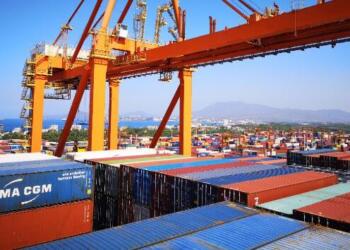
Following his inauguration as the 47th President of the United States, Donald Trump spoke out about his first actions, including issuing a declaration of emergency and sending troops to the southern border to end migration , which would lead to situations that could generate uncertainty for freight transport.
Transportation sector specialists in the Mexico-United States border area told T21 about the impact that the measures of the President of the United States will have .
Manuel Sotelo Suárez, vice president of the northern region of the National Chamber of Cargo Transportation (Canacar) , explained that they are attentive to what may happen , although he commented that for the moment customs continues to work without any news.
“We have not received thousands of thousands of migrants, nor has the loading stopped, we do not know what will happen in the next hours, in the next days. I believe that if Mexico coordinates with the United States and manages the issue of migrants well, if they were more humane with them, it would be better,” said Sotelo.
For his part, Edgar Zamorano, delegate of Canacar Reynosa, indicated that both Trump’s immigration control and tariff measures bring concern to the sector. He stressed that they will bring logistical and operational challenges for cross-border trade.
“Among these is the possibility of a temporary closure of the border, which could have a devastating effect that we have already experienced before. This could bring very significant economic losses not only for transporters but also for customers,” Zamorano stressed.
For him, in the event of a partial border closure, the most affected sectors would be manufacturing, food-grade products , among others. He also considered that border crossing checks could be more aggressive .
“This can result in long lines and delays in goods,” Zamorano said.
In addition, the Canacar Reynosa delegate highlighted that although transporters and clients have already adhered to the required safety standards , there are vulnerable sectors such as the transportation of mining loads and agricultural production .
Zamorano explained that Trump’s measures on the border could bring with them:
- Additional costs related to working hours, fuel consumption and penalties for failure to meet delivery deadlines.
- Loss of competitiveness , as companies that rely on just-in-time trade would face disruptions in their supply chains, which could lead to seeking alternatives that are less dependent on cross-border trucking.
- Impacts on logistics planning , because carriers and their customers must seek alternative routes, such as relocating loads to seaports or using trains, which increases costs and affects efficiency.
Along the same lines, Israel Delgado, vice president of the northwest region of Canacar, recalled the temporary closure of the border in 2019 due to Trump’s immigration control policies, which at that time brought trucks paralyzed at the border , which had to wait between 12 to 15 hours to cross.
“Today we have a similar scenario that could lead to slowdowns at the borders,” Delgado said.
He stated that another concern as transporters is the review of the Treaty between Mexico, the United States and Canada (T-MEC) .
“The second concern is in economic and tariff matters, everything that is said in terms of industry and trade will have an impact on imports and exports and therefore on freight transport,” said Delgado.
However, he said they are confident that the Mexican government can reach agreements that benefit the sector.
Finally, Hector Hinojosa, Canacar delegate in Nuevo Laredo, commented that although he does not believe that the borders will be closed , he agrees that border inspections may become more severe for cargo transportation.
“Delays can lead to multimillion-dollar losses. However, we have always had good communication with Mexican and American authorities at the border to handle any type of situation that may arise,” Hinojosa explained.
Experts agreed that the immigration and trade policies announced by Trump create a scenario of uncertainty for freight transportation, with possible significant impacts on logistics, operating costs and the competitiveness of cross-border trade .
However, they stressed the importance of maintaining coordination between the governments of Mexico and the United States, as well as collaboration between transporters and authorities to minimize risks and ensure the continuity of operations. Preparing with proactive strategies and constant communication will be key to mitigating the effects of these measures and safeguarding the stability of the sector.
(Main photo source: Instagram Donald Trump)
Comment and follow us on X: @karinaquintero / @GrupoT21















